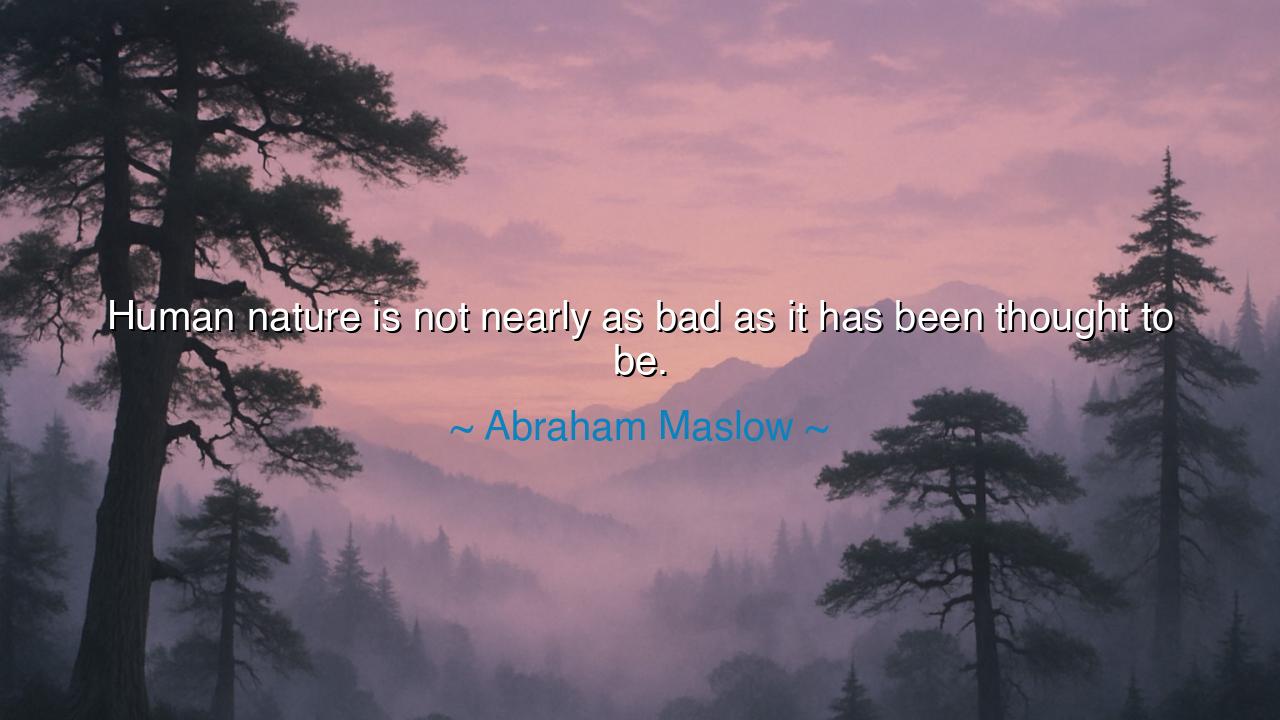
Human nature is not nearly as bad as it has been thought to be.






Hear, O children of hope, the words of Abraham Maslow, the wise seeker of the heights of the human spirit: “Human nature is not nearly as bad as it has been thought to be.” In this gentle yet defiant utterance, Maslow stood against centuries of suspicion and cynicism. Too long had mankind been told that his instincts were wicked, that his desires were corrupt, that his very nature was a curse. Maslow, through study and vision, proclaimed instead that within man lies not only selfishness but also generosity, not only greed but also love, not only despair but also the capacity for greatness.
Maslow, father of humanistic psychology, built his teachings upon the hierarchy of needs—those steps of life that begin with survival and rise toward self-actualization. He saw that when basic needs are met, man does not remain chained to the animal, but strives toward truth, beauty, justice, and compassion. He did not deny the shadow within human nature, but he revealed that the light within it is greater than often believed. For what man longs for, at his deepest, is not ruin but wholeness, not destruction but growth.
Consider the long tradition against which Maslow spoke. Think of Thomas Hobbes, who declared that in his natural state, man’s life is "solitary, poor, nasty, brutish, and short." Think of doctrines that painted mankind as hopelessly corrupt, fit only for punishment or restraint. These voices saw only the darkness. Maslow, by contrast, saw that the same human nature which breeds conflict also creates art, nurtures children, builds civilizations, and dreams of peace. His vision was not naive but courageous: to remind us that we are not doomed by our nature, but lifted by it.
History itself testifies to his wisdom. After the horrors of World War II, many believed that human nature was nothing but cruelty unmasked. Yet from the ruins arose acts of astonishing generosity: nations rebuilding one another, communities sheltering strangers, individuals risking their lives to heal and restore. The very war that revealed the capacity for evil also revealed the resilience of compassion. In the Holocaust itself, there were those who, at risk of their lives, hid the persecuted—proof that even in the darkest soil, the seeds of goodness bloom.
The lesson is profound: do not look upon yourself or others with despair. Yes, there is weakness in mankind; yes, there is cruelty and folly. But there is also kindness, resilience, courage, and the hunger for meaning. If you believe that humanity is rotten, you will live as though nothing can be redeemed. But if you believe, as Maslow taught, that humanity is better than it is thought to be, then you will seek to draw out the good, to nurture it, to let it flourish.
Practical wisdom follows: treat others not as beasts to be restrained, but as beings capable of greatness. Expect goodness, and you will often find it. Teach children not only rules, but hope. Trust your own higher instincts, and seek to live in ways that lift you toward truth and beauty. In workplaces, in families, in nations, build systems that call forth compassion rather than suspicion. For people will rise more often when they are trusted to rise.
Thus, O children of tomorrow, hold Maslow’s words close: “Human nature is not nearly as bad as it has been thought to be.” Do not surrender to cynicism, for cynicism blinds the eye and hardens the heart. Instead, walk with faith in the better angels of our nature. Nurture them in yourself and others, and you will see them grow. For though man is frail, though history bears scars, yet within humanity lies a power for goodness greater than all its wounds.






AAdministratorAdministrator
Welcome, honored guests. Please leave a comment, we will respond soon